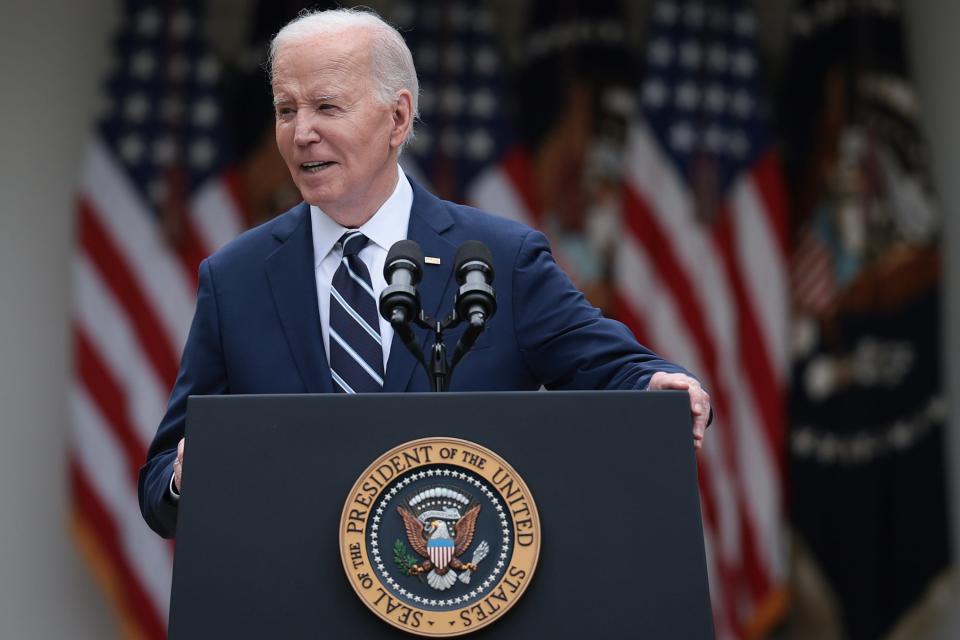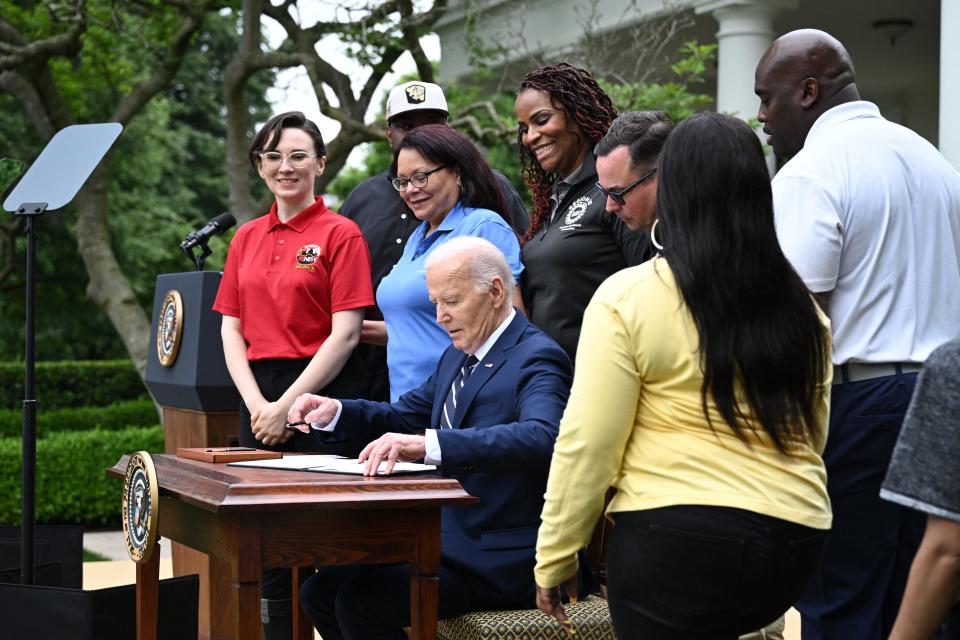Biden sets huge new tariffs on electric vehicles, chips and other goods from China
WASHINGTON − President Joe Biden is hiking tariffs on electric vehicles, semiconductors and several other goods imported from China, escalating a trade war between the two world's largest economies as the administration accuses Chinese competitors of unfair practices in industries the U.S. is trying to grow.
The moves, which come amid rising tensions between the U.S. and China, are designed to protect American industries in clean energy that the administration has targeted with major investments to try to catch up with China.
Other goods from China that will face higher tariffs include solar cells, batteries, battery materials, cranes used at ports, and certain medical supplies, as well as steel and aluminum.
More: Biden sends message to China ― and working-class voters ― with tariff threat
The Biden administration has for months accused China of unfair trade practices by flooding the global markets with goods at artificially low prices, putting U.S. manufacturing of electric vehicles, microchips and other goods at a steep disadvantage. Because Chinese industries are heavily subsidized by the government, the White House says Chinese competitors can overproduce without worrying about a profit.
Biden signed a memorandum ordering the new tariffs during a White House Rose Garden ceremony Tuesday as he also accused China of stealing intellectual property from U.S. companies through cyber espionage.
"When you make tactics like these, it's not competition, it's cheating, and we've seen the damage here in America," Biden said, adding that the new tariffs will "ensure that our workers are not held back by unfair trade practices."
More: President Biden's new tariffs on goods from China will affect EVs, semiconductors and more

Biden, whose administration has reviewed the tariff rates over the past year, is keeping intact more than $300 billion in tariffs imposed by former President Donald Trump. The tariff increases include:
Electric vehicles from China: from 25% to 100% beginning this year.
Semiconductors from China: from 25% to 50% by 2025.
Lithium-ion batteries from China used in electric vehicles: from 7.5% to 25% this year.
Solar cells imported from China: from 25% to 50% this year.
Steel and aluminum products: from zero-7.5% to 25% this year.
Ship-to-shore container cranes imported from China: from zero to 25% this year
Hospital syringes and needles made in China: from zero to 50% this year.
The White House has said steel and aluminum produced in China are not subject to the same environmental standards as companies in the U.S., also giving China an unfair trade advantage.
"For too long, the PRC has been playing by a different set of rules," said Katherine Tai, the United States trade representative in the Biden administration.

China pushed back strongly against the higher tariffs.
Wang Wenbin, a spokesman for the Chinese Ministry of Foreign Affairs, called the moves "self-defeating" and against the consensus reached last November by Biden and Chinese President Xi Jinping at a summit in San Francisco.
"More importantly, it will harm the world’s green economic transition and climate action," Wenbin said. "We urge the U.S. to stop repairing and digging up the road at the same time, so to speak, and create enabling conditions for China-U.S. climate cooperation and global green transition."
Another ministry spokesman said last Friday that "China will take all necessary measures to defend its rights and interests."
Tai said the tariff increases "should by no means be a surprise to our counterparts in Beijing" because the administration has relayed trade concerns to China for more than three years. She said the moves are "not about escalation" with China.
Biden, in an interview with Yahoo Finance, said he expects a minimal response from China. "I don't think they'll lead to any international conflict or anything like that," he said of the tariffs, "but I think they'll probably try to figure out how they can raise tariffs maybe on products that are unrelated."
More: President Biden moves to triple tariff rates on Chinese steel and aluminum
The tariff moves come as Biden is courting the support of working-class voters in Midwest battleground states including Michigan, the center of the U.S. auto industry, for the November election.
"We're not going to let China flood our market, making it possible for American auto manufacturers to compete fairly," Biden said. "We’re never going to allow China to unfairly control the market for these cars — period."
Biden is borrowing from the trade playbook of Trump, the Republican presumptive nominee, who routinely raised tariffs on Chinese goods during his four years in office. Trump responded to Biden's tariff increases to reporters outside a New York courtroom on the 17th day of his hush-money trial.
"Where have you been for the last 3½ years? They should have done it a long time ago," Trump said. "But they've also got to do it on other vehicles, and they have to do it on a lot of other products. Because China's eating our lunch right now."
Biden has sought to differentiate his tariff approach with his predecessor's plan for new tariffs. Trump has proposed a 60% or more tariff on all Chinese imports and warned that the U.S. auto industry will face a "bloodbath" if he loses his election in November.
In his remarks, Biden slammed Trump's plan as "across-the-board tariffs on all imports from all countries" that would raise prices for American consumers. "He simply doesn't get it," Biden said.
Biden called for the tripling of tariffs on steel and aluminum imports from China during a campaign speech last month before the United Steelworkers union in Pittsburgh.
Each of the tariff increases reflects the recommendations of Tai, who evaluated the rates as part of a required four-year review.
More: 'A con': President Biden trolls Trump with $3.3 billion Microsoft AI project in Wisconsin
Biden has staked his economic agenda on reigniting a U.S. manufacturing boom centered on electric vehicles and clean energy.
The Biden administration says it has helped spur more than $860 billion in private investment through legislation passed during Biden's first two years in office that incentivized the manufacturing of electric vehicles, clean-energy products, microchips and other investments.
Lael Brainard, director of the National Economic Council in the White House, said the objective of the higher tariffs is to "make sure that historic investments in jobs spurred by President Biden's actions are not undercut by a flood of unfairly underpriced exports from China."
She added that the goal is for American workers to have "a level playing field in industries that are vital to our future."
Reach Joey Garrison on X @joeygarrison.
This article originally appeared on USA TODAY: Biden slaps new tariffs on Chinese electric vehicles, other goods